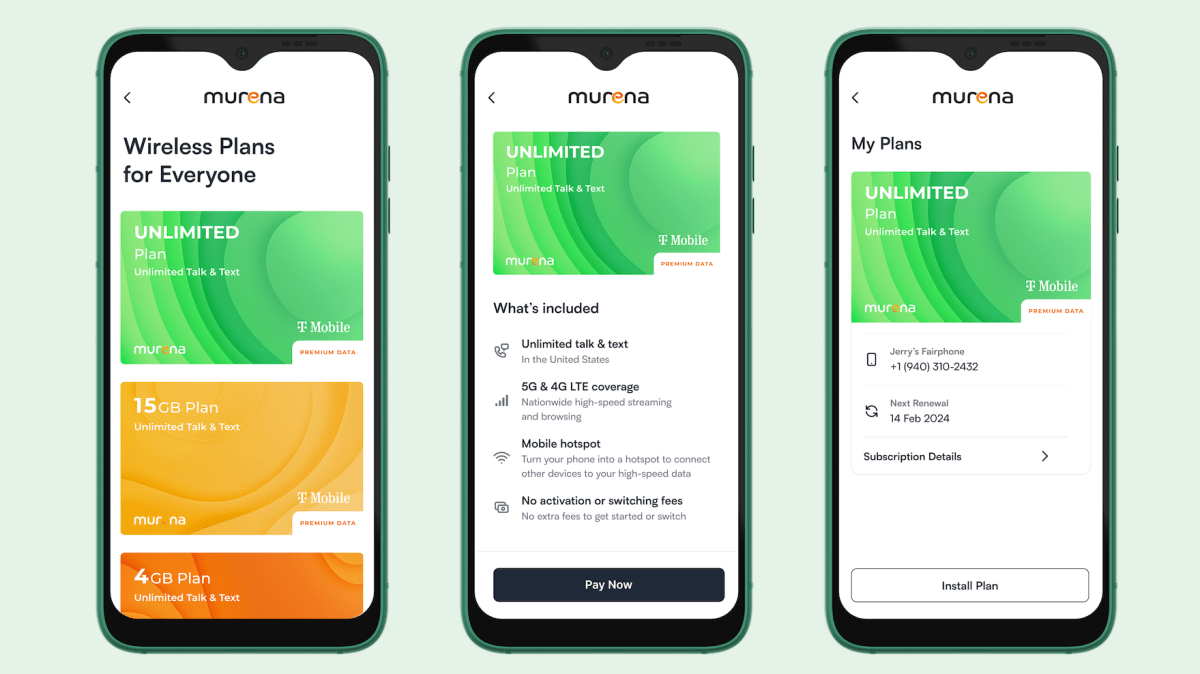
Murena, a French startup that sells “de-Googled” smartphones replete with its own flavor of Android, is launching an own-brand mobile network as it throws its hat into the fast-growing mobile virtual network operator (MVNO) ring.
Murena Mobile, as the new service is called, is built atop T-Mobile and is available to U.S. customers only. Available plans range from 4GB data at $35/month through to unlimited data, which costs $65, with unlimited calls and texts available across the board.
As TechCrunch reported this month, the MVNO space is hot, with countless companies piggybacking off big telco infrastructure to launch new mobile network brands that differentiate substantively through branding targeted at niche customer segments.
The driving force behind much of this growth is the availability of new technology that makes it easier to become an MVNO — this includes mobile virtual network enabler (MVNE) software that takes care of the infrastructure such as SIM card provisioning, billing, user management, customer support, analytics and more. Plus, with the advent of eSIM, it’s easier (and more cost-effective) to have an all-digital distribution strategy, as we’ve seen with Sam Altman–backed “Ai Pin” startup Humane.
It’s these advances that Murena is taking full advantage of with its move into the $84 billion MVNO realm.
Privacy push
Founded in 2018, Murena has developed its own operating system called /e/OS, which is built on the Android-based fork LineageOS. Users can either install /e/OS themselves on supported devices or procure it pre-installed on a handful of smartphones Murena sells — these include refurbished handsets such as Google’s Pixel 5 and Fairphone.
Murena’s big pitch is privacy, with all of the usual Google apps replaced by open source alternatives, or software that purports to be anti-tracking and privacy-centric.
Aside from selling the phones themselves, Murena has so far sought to monetize through add-on services such as cloud plans, which offer something a little like Google Workspace, with email and productivity tools that sync across devices. With Murena Mobile now thrown into the mix, it has another recurring revenue stream to lean on.
“This approach not only provides financial stability, but allows for a better long-term planning for this service and other future plans,” Murena chief operating officer (COO) Alexis Noetinger told TechCrunch. “It is also a great way for people believing in our mission to contribute to our project, instead of going directly to a carrier that they don’t care about.”
This is similar to U.S. minimalist phonemaker Light, which has offered mobile plans for several years. Light recently switched to a new MVNE provider called Gigs, which touts itself as a “Stripe for phone plans” — a plug-and-play platform that gives budding MVNOs everything they need through a single API. And it’s Gigs that will also power Murena’s foray into the world of MVNOs.
“For us, we can manage and help our subscribers if they need anything, all from a single dashboard — which makes our life easy,” Noetinger said. “And for our customers, they can access their plan easily and manage their subscription without any effort.”

Gigs Dashboard Image Credits: Gigs
That a European company would offer its new service in the U.S. only is telling of where it sees the biggest opportunity — particularly as it relates to Murena’s core privacy-loving target market.
While Murena does collect some personal information, including the customer’s email address, name, address and credit card details, this stops short of the level of data that is often required by big carriers, which are known to sell this data to advertisers.
“We learned that signing up for a mobile plan in the U.S. can be quite complex, even today — most of the time you need to go through a credit check, share your social security number, validate an ID, and so on,” Noetinger said. “So in the process of setting up your mobile plan, a lot of personal data is captured, with no real need for it, increasing the risk of being retargeted later or of having this data falling in the wrong hands. The less data shared the better.”
Murena also intends to bring its new mobile plans to Europe some time in 2024, while it will eventually support physical SIM cards — but for now, Murena Mobile is all about eSIM.
This actually highlights a flaw with Murena’s new mobile network offering — not all phones support the eSIM format, including some of the devices it sells through its own online store. Additionally, customers can’t actually sign up for a Murena Mobile plan at the same time as buying one of its eSIM-supported devices — they have to complete that transaction separately.
“We know this is not ideal, and we plan to improve this in 2024,” Noetinger added.
So today just signals the start of what Murena hopes will be part of a “package” that draws new customers in, and keeps existing customers on board. And this could lead to further product bundling to make the Murena brand a stickier proposition.
“The main purpose of launching Murena as an MVNO is to offer a seamless and integrated solution for privacy-conscious individuals,” Noetinger said. “In the future, we could think about a complete package with phone, cloud plan and a mobile plan all combined in a monthly subscription.”





